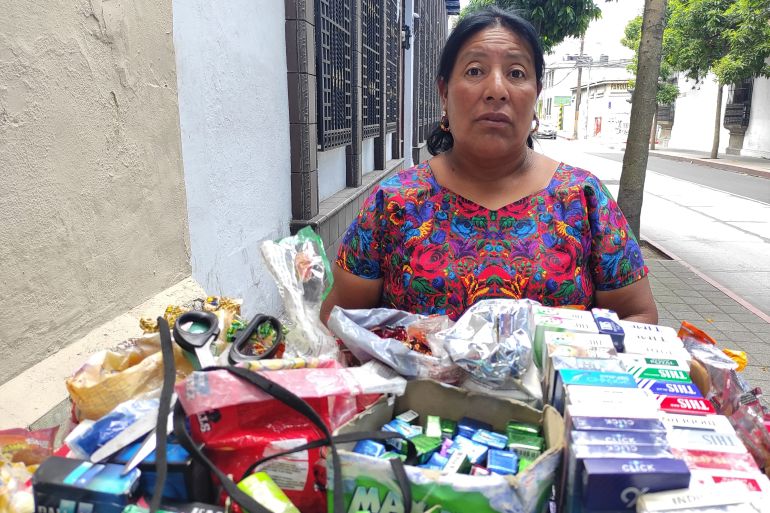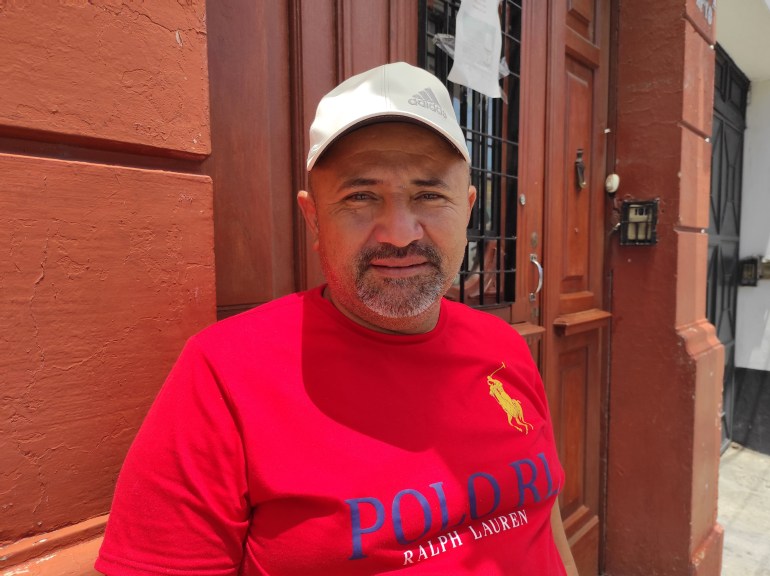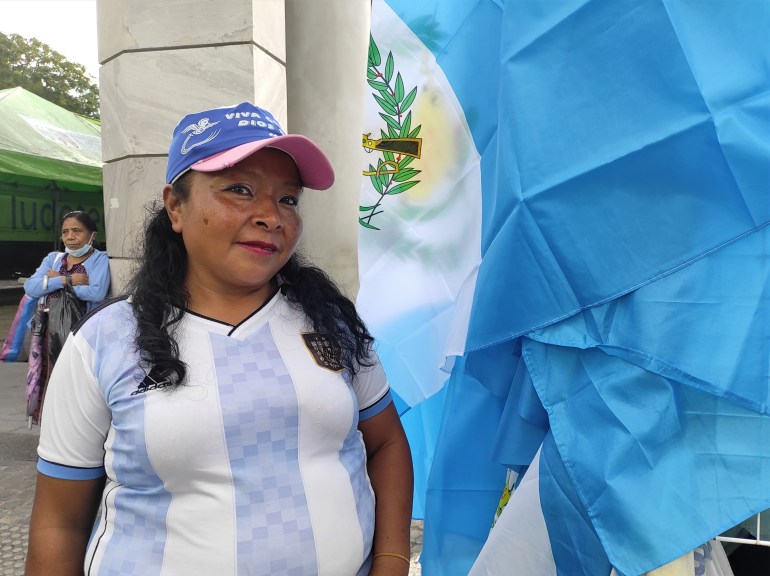‘There is no work’: Guatemala political crisis spotlights calls for change
Guatemalans have mixed expectations for next government as president-elect’s path to office fraught with uncertainty.

Guatemala City, Guatemala – Guatemala continues to be roiled by political turmoil following last month’s election run-off, with rallies picking up again in cities and towns around the Central American nation to protest efforts to undermine the vote.
But while many Guatemalans are caught up in the crisis, others have more pressing everyday concerns, such as making ends meet in a country where nearly 60 percent of the population lives in poverty.
Keep reading
list of 3 itemsGuatemala arrests anti-corruption lawyer, prompting international outcry
Arevalo wins Guatemala presidency in landslide amid hopes for change
The poverty rate is closer to 80 percent for Indigenous people while roughly 70 percent of workers in Guatemala labour in the informal economy.
Maribela Ixcoy is among them. An Indigenous Maya K’iche’ single mother originally from Santa Cruz del Quiche, she earns between $5 and $10 a day selling candy, gum and cigarettes from a shopping cart in the capital, Guatemala City.
“There is no money. There is no work,” Ixcoy told Al Jazeera while she arranged her cart.
She said she wants government action to rein in the rising cost of basic goods and to create jobs – but the country’s post-election turmoil has raised new questions. “The only thing is I don’t know if anything will change,” she said.
The political crisis
Bernardo Arevalo, a centre-left sociologist and congressman, won Guatemala’s August 20 presidential run-off election.
But he and his party Movimiento Semilla, Spanish for Seed Movement, have faced legal battles, criminal investigations and other attempts to undermine the results, raising concerns both inside and outside the country.
“We are witnessing a coup d’etat in which the justice system is used to violate justice,” Arevalo said during a news conference on Friday. “It is being carried out step by step.”
Last week, just as Arevalo’s victory was certified by Guatemala’s electoral tribunal magistrates, Movimiento Semilla’s legal status as a party was temporarily suspended by the citizen registry, a body within the electoral tribunal, based on a judge’s order.
The move came in connection with an ongoing investigation into alleged irregularities in the party’s paperwork five years ago that is widely viewed by analysts and international institutions as political persecution.
Many observers worry that the ultimate goal of election-related legal action – spearheaded by the public prosecutor’s office under Attorney General Consuelo Porras – is to prevent Arevalo and Vice-President-elect Karin Herrera from taking office on January 14.
“It is a major concern,” said Santos Diaz, keeping an eye on the entrance to the small Guatemala City parking lot where he works as an attendant.
“It is because of corruption, for the love of money,” Diaz told Al Jazeera. “They do not see the good of the people, just their own well-being.”
Transition process begins
Sandra Torres, the conservative former first lady who lost last month’s run-off to Arevalo, has still not conceded the election and her party has filed legal motions to try to overturn the certification of results.
Nevertheless, the first government transition meeting between outgoing President Alejandro Giammattei and Arevalo is scheduled for Monday afternoon.
Luis Almagro, secretary-general of the Organization of American States (OAS), arrived in Guatemala on Monday to accompany the meeting and monitor the situation in the country at the outset of the transition period.
In a resolution on Friday, the OAS permanent council requested that Almagro meet with the attorney general’s office and highlight that “the use of the legal system as a tool to intimidate and to improperly change election results is unacceptable”.
A spokesperson for the office did not immediately respond to Al Jazeera’s request for comment on the potential meeting with the OAS.
Meanwhile, Arevalo’s party secured an important, albeit temporary, victory on Saturday when electoral tribunal magistrates reversed the August 28 resolution declaring the party’s provisional suspension.

The reinstatement of Movimiento Semilla is in effect through at least October 31, when the electoral period officially ends. Guatemalan law prohibits the cancellation of parties during that period.
The executive committee of Congress converted current and future Movimiento Semilla lawmakers into independents last week following the party’s suspension – a designation that prevents them from presiding over commissions and other leadership roles.
But the committee said on Sunday that the party caucus and affiliations will be restored once Congress obtains documentation from the citizen registry.
That same day, the electoral tribunal also urged all three branches of government to ensure respect for the popular will expressed at the ballot box.
“[Arevalo] is the president people elected,” said Sandra Aguilar, who works alongside her husband, Diaz, in the parking lot to support their four children. “It is good. We want to give him a chance.”
Demands for change
Defending democracy was a popular refrain among hundreds of protesters who gathered on Saturday in Guatemala City’s central plaza, where people clamoured for the attorney general’s resignation.
Carmen Tino, one of several street vendors supplying demonstrators with national flags, looked on with approval.
“They are struggling for a better Guatemala,” Tino told Al Jazeera in a corner of the plaza, next to her stand with flags and umbrellas. “I hope there are much-needed changes to benefit children and education.”
Elsewhere in the capital, Alexander Sandoval said unemployment was his chief concern.
He lives in the department of Zacapa, 150km (93 miles) northeast of Guatemala City, and makes $11.50 a day working for a melon farming company. But that is only four months of contract work and after that jobs are hard to come by.

“We will see what happens,” said Sandoval, referring to the suspension of Movimiento Semilla, but he also said he does not have much hope either way.
“I think things will stay the same here,” he told Al Jazeera. “Whoever ends up as president, there will be no change.”
Diaz was a bit more optimistic, explaining that his hope stems from the legacy of Arevalo’s father, former Guatemalan President Juan Jose Arevalo.
When he took office in 1945, the senior Arevalo kicked off a decade-long “democratic spring” in favour of labour rights, public services and agrarian reform, but it ended when a United States-backed military coup overthrew his successor.
“The truth is, I do not believe 100 percent but maybe 20 percent that things will really change,” Diaz told Al Jazeera. But that change, he said, will require “a government that works for the country and not in its own interests”.